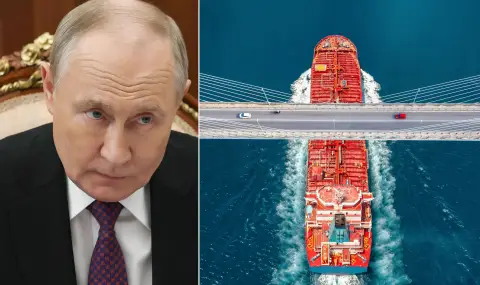The Russian “shadow fleet“ is alive thanks to Western countries, reveals the Follow the Money project, which in cooperation with Western investigative journalists made shocking revelations.
After the full-scale invasion of Ukraine, sanctions were imposed on Russia and Vladimir Putin faced a big problem: how to maintain the oil trade by building a new fleet of shadow ships.
It turns out that Russia's oil tankers were purchased by European shipowners, who generated over $6 billion in profit from these sales. Many of these aging ships, which would otherwise have been decommissioned, now sail the seas under complex, opaque ownership structures, often without adequate insurance against environmental disasters.
Investigators have concluded that more than a third of Russia’s shadow fleet consists of tankers that were formerly owned by Western countries – the same countries that have sanctioned Russia for its aggression against Ukraine.
The 230 aging tankers in question have been sold at extremely high prices, allowing their former owners to collect more than $6 billion for ships that would otherwise have been scrapped.
It’s not just the ships that keep Russia’s “shadow fleet” moving. Many of the crew members, often working in dangerous conditions, are employed by agencies based in Ukraine and within the European Union. In doing so, they play a crucial role in maintaining the shadow fleet. Twenty of the recruitment agencies serving the shadow fleet are based in Ukraine.
Among the ships sold by Russia, Greece is the leader - 127 tankers that were once in Greek hands are now part of Putin's shadow fleet. 22 ships come from the UK, 11 from Germany and eight from Norway.
According to estimates, the Russian shadow fleet currently transports 70 percent of all Russian oil exports.
The ships are registered in various countries around the world, often with unclear ownership structures and in many cases without insurance coverage, which is why environmental groups have also repeatedly warned of the dangers - not to mention the fact that sanctions against the trade in Russian oil seem to have no effect.
Western governments say ships from the shadow fleet are used to transport Russian oil, carry out espionage for Moscow and map, and sometimes destroy, vital underwater infrastructure such as cables.
Direct sales of oil tankers to Russian entities are banned under EU sanctions imposed in 2023. But through various dark schemes, such deals are possible. Economists say sanctions efforts have not been effective enough if these tankers could end up in Putin’s shadowy fleet.
It is precisely this oil money that is financing Putin’s war on Ukraine.
EU sellers are required to ensure that their ships do not circumvent sanctions. The EU has ordered European shipowners to report to national authorities when they sell a ship to a buyer outside the bloc. Despite these measures, the deals in question have still happened. The companies say it is “beyond their control” to know who operates the ship after it is sold, trying to avoid liability. The ships are sold to companies registered in jurisdictions such as the Seychelles, where it is difficult to control transactions. The companies are registered to individuals who cannot be linked to the Kremlin.
In several cases, the ships have also been sold a second or third time through a different country before arriving in the shadowy Russian fleet. Often, the ships are renamed several times in the course of these operations so that they cannot be linked in any way to Russia.
In addition to undermining efforts to put financial pressure on Russia’s treasury, the shadow fleet’s reliance on old tankers increases the potential for maritime disasters. Many of the tankers have reached an age at which they would normally be decommissioned because the basic maintenance costs exceed what can be gained by selling the ship for scrap, and the ships in the shadow fleet do not have Western insurance against oil spills. This increases the likelihood of accidents and major environmental damage.
Countries such as Greece, Cyprus and Malta, which rely on the maritime industry, have expressed concerns about the stricter enforcement of sanctions. And incidents involving damaged undersea cables in the Baltic Sea have reignited the debate about a more decisive approach by Western countries.
